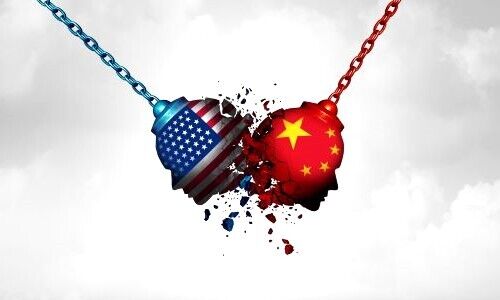US and China Take a Break from Geopolitics
A meeting in Zurich between the US Treasury Secretary and a key Chinese leader hints at warmer ties. That is something bankers in Asia would more than welcome.
Well, for once, it wasn’t the usual Taiwan airspace incursion or South China freedom of navigation exercise. Instead, top US Treasury official, Janet Yellen, and China Vice Premier Liu He seemed to have a relatively pleasant, substantive discussion during a meeting in Zurich Wednesday.
The knowledge that it took place without the usual recrimination and fallout should be a salve to the soul of any senior banking leader in Asia given it indicates, at the very least, a small serving of reason after years of increasing geopolitical tension.
Certain Detente
The messages put out to the media largely jibed on both sides, also confirming a certain détente, and they came on the heels of unexpectedly friendly comments between Australia and China, as finews.asia recently reported on.
The US readout of the meeting started with an altogether balmy prelude, portraying it as a follow-up to that between Presidents Joe Biden and Xi Jinping last November in Bali.
Zurich was seen as a further effort to «deepen communication and work together», although that was followed up by the weightier sentence that Yellen and He had held a «candid, substantive, and constructive» conversation.
Right Noises
The US statement then went on to make the right noises about keeping the global economy going, while making passing references to sustainable development, climate finance, and emerging markets.
It even somewhat soft-pedaled areas of disagreement, saying Yellen had «also raised issues of concern in a frank exchange of views» before indicating her intention to travel to China while welcoming her Chinese counterparts to the US.
An altogether elegant piece of diplomacy that is unlikely to get anyone to feel like they have lost any face – but one that is unlikely to play quite as well with the more conservative factions of the US electorate.
Bali - Again
He also started by referring to Bali, noting that China had held «in-depth, candid and practical exchanges» on the macroeconomic and financial situation of the two countries.
What is notable here is that «candid» was used by both in interpreting the talks, with China then choosing «in-depth» while the Americans used the largely similar «substantive».
The only key difference was that Yellen termed the discussion «constructive» while He indicated they were «practical». Overall, besides that, the similarity in tone and content was striking.
Critical Stage
He did go further than Yellen in saying that the world’s recovery is «at a critical stage» which leaves the impression that the urgency is slightly more on the Chinese side than it is on the American one, at least when both statements are taken together, or maybe not if you look at Yellen’s initial speech ahead of the meeting.
In those remarks, which were published separately on the Treasury’s website, Yellen had characterized the current global economic outlook as «complicated» while saying there was a «pressing need» between the world’s two largest economies to communicate on macroeconomic and financial conditions as well as challenges.
He then went down a similar laundry list as Yellen did, mentioning the need to jointly address economic challenges, cooperate on sustainable finance, on emerging markets, as well as strengthening bilateral and multilateral frameworks.
Tech Sanctions
Here things get interesting. He mentioned a specific concern about the American economic, trade, and technology policies toward China, hoping that the US would «pay attention to the impact of these policies on both sides».
Once again, another piece of elegant diplomacy not aimed at insulting a specific individual although it does seem to indicate that US measures are potentially causing more pain than the Chinese government has publicly indicated.
Still, he followed that up by saying that Yellen was welcome to visit China «at an appropriate time this year» while not indicating if he would do the same.
Empty Exercise
So what gives? This whole exercise in cozying up could simply be that following Russia’s invasion of Ukraine nobody is interested in inflaming tensions any further, as that is likely to be a largely empty exercise at this point. And one fraught with risk.
Yellen herself seemed to hint at that in her introductory remarks, saying: «we share a responsibility to show that China and the United States can manage our differences and prevent competition from becoming anything ever near conflict.»
The truth is that both face intractable, big-country problems. Between all the geopolitical pettiness and the Jack-whatever-in-the-box markets, the US has another exercise in the perennial debt ceiling back and forth ahead of it, and the possibility of a looming recession. China has a wide-ranging post-zero Covid fallout to contend with as well as post-pandemic structural growth issues.
Jobs and Growth
In many ways, both governments have the same economic and financial worries related to stability, growth, and jobs. That, and Ukraine, is likely forcing them to be more reasonable.
For Asia’s banking industry leaders and governments, they should now hold Yellen, the US, and China to one of the more well-put statements made in her opening remarks.
«While we have areas of disagreement, and we will convey them directly, we should not allow misunderstandings, particularly those stemming from a lack of communication, to unnecessarily worsen our bilateral economic and financial relationship,» she said.























